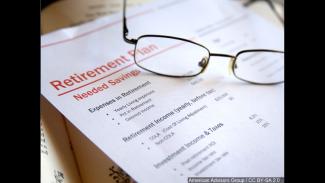
Why the rule of thumb about needing 70% of pre-retirement income may not work
Over the years, we have worked with many clients helping them plan for retirement. Sometimes these conversations occur early in their careers, but more often when people are closing in on the big day. Regardless of the timing, the questions and concerns are similar:
- How much money will I need to accumulate in order to retire comfortably?
- Will I have enough money to retire?
- How can I avoid running out of money?
These are valid questions often answered by citing a rule of thumb that suggests you’ll need something like 70% - 80% of your pre-retirement income once retired.
However, using this standard may not lead to an accurate answer. It may make more sense to look at the level of expenses that you’ll need to meet in retirement.
Let’s look at an example. Paula and Barbara have been friends for many years. They work together, and are both planning to retire next year. And they both have the same question: “How much do I need in retirement?”
They both plan on traveling in their retirement years. Paula and her husband plan on using their RV to crisscross the country, visiting all the national parks, checking out Route 66 and just spending lots of time on the road.
Barbara and her husband also plan on traveling in retirement. Their planning includes river cruises in Europe, a trip to South America, spending time in the Caribbean, and well - you get the idea.
These two couples have very different expense needs in retirement. Obviously, Barbara and her husband will need more money in retirement than Paula and her husband.
This is why that rule of thumb about needing 70% 80% of what you were earning before retirement doesn’t really hold water.
Retirement can mean many different things to different people. Winters down south and summers up north. Staying put and caring for grandchildren. Travel around the world. Tinkering in the garage. Volunteering.
In order to plan your retirement and estimate your income needs, you have to first start with what you anticipate your expenses to be. That can admittedly be a challenge. It’s not uncommon for clients to not know what their expenses are currently, much less be able to guess what they will be in retirement.
To that end, we have tools today that can help us more easily track our expenses. Once we know what we are spending now, it becomes easier to project what we’ll need in retirement. Using our examples above, Barbara and her husband need to figure on a larger travel budget.
Online tools like Mint or our financial planning software, eMoney, can link checking accounts and credit cards into what looks like an old-fashioned check register. Over time, you can easily track your spending as the software breaks purchases and expenses down into categories. Credit unions, banks, and credit cards offer similar tracking and categorizing programs.
Getting a handle on where your money goes now can provide important insight into how much you will need in retirement. Once you know what you’ll need, figuring out the rest of the pieces in retirement will be much easier, and more accurate.
